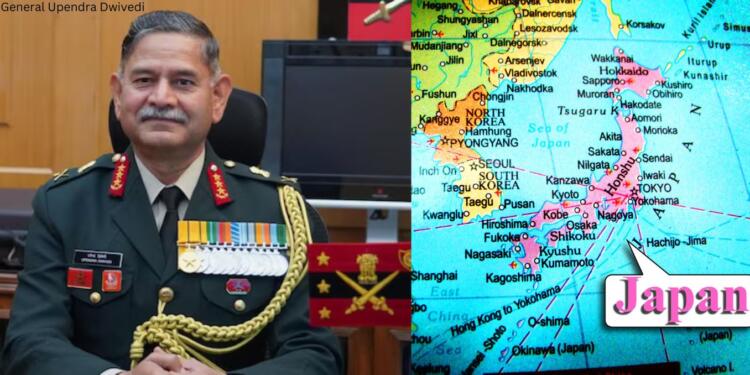General Upendra Dwivedi, India’s Chief of Army Staff, arrived in Japan this Monday, during which he is scheduled to spend four days focused on furthering military ties and cooperation through a strategic partnership between the two nations. Today, his talks with the military officials of Japan are part of various key discussions to strengthen defense ties as well as regional security issues.
During his three-day visit, General Upendra Dwivedi began by meeting Indian Ambassador to Japan Sibi George at the Indian Embassy in Tokyo on the first day. This gave him a chance to review the emerging dynamics in India-Japan relations, specifically in defense collaborations and regional stability. Both officials will likely cast their look towards ways for more substantial cooperation in the wake of changing geopolitical paradigms across the Indo-Pacific region.
A high point of General Dwivedi’s visit was his paying respects to the victims of the atomic bombing in Hiroshima by laying a wreath at Hiroshima Peace Park. Such acts are gestures of respect and commitment to peace, and hence speak to shared history and values that form the bedrock of the bilateral relationship.
Top of the agenda for the coming days will be high-level deliberations with senior leaders of the Japan Self-Defense Forces. On October 15, General Dwivedi will meet General Yoshida Yoshihide, Chief of Staff of Japan’s Joint Self-Defense Force and General Morishita Yasunori, Chief of Staff of the Japan Ground Self-Defense Force. The discussions are likely to focus essentially on operational cooperation, joint exercises, and intelligence sharing-a pre-requisite for building interoperability between the two armies.
The visit also happens at a time when both countries are keen to strengthen their strategic cooperation in the context of the rising tension in the region. India and Japan have been collaborating closely in various defense sectors, including maritime security, cyber defense, and counterterrorism. Discussions that are going to take place during this visit are likely to lay down the foundation for the future initiatives and joint operation which may possibly fortify security and stability in the Indo-Pacific region.
Thus, General Dwivedi’s visit underlines defense diplomacy as central to strong ties between India and Japan in an increasingly complex security environment. They are trying to strengthen both their bilateral engagements and regional order into a more secure and resilient one through this engagement.




















